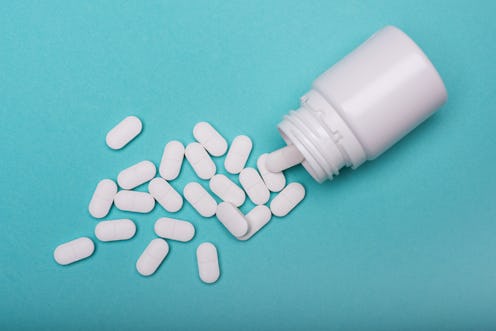
If you've ever been prescribed a medication — whether for a chronic illness, for mental health, or just a round of antibiotics to nip an infection in the bud — then it's possible you've noticed that foods taste a little off while you're taking it. It can be hard to chalk up what the cause is for a temporary change in your taste buds' ability to do their job, and if you've ever experienced this, then you can attest to how frustrating it can be. So once and for all: Can medications make your food taste different? Apparently, the answer is yes. Your prescriptions or over-the-counter meds may very well be to blame for your altered sense of taste.
Here's the deal. While experiencing a change in the way things taste is reportedly most common amongst elderly people who are on multiple medications, anyone can experience this strange phenomenon, depending on what medications they're taking and how their body's chemistry reacts with the drugs. The list of medications that can affect the way we taste things is pretty long(like, hundreds of medications long), and it includes many prescription and over-the-counter drugs that are commonly used. Everything from certain antibiotics and allergy medicines to muscle relaxers and stimulants have been linked to a change in the way we perceive taste.
There's actually a scientific term for this syndrome, too. "A change in the body's ability to sense tastes is called dysgeusia," explained WebMD. "Usually the taste changes are temporary and go away when you stop taking the medicine." And it's not just a medication-induced change in taste buds that can contribute to an altered perception of taste. Some medications can also affect our sense of smell or the amount of saliva that we produce — both of which are factors that can affect the taste of food just as much as our taste buds can.
If you're experiencing a loss of taste or smell as a result of your medication, it's important to take note and not ignore it — as it can result in issues that go beyond a hindrance to an enjoyable food experience alone. "Patients with compromised smell and taste senses can experience family discord and expose themselves and others to danger because they cannot detect spoiled food, leaking gas, or smoke," explained Dr. Norman Mann on Clinical Advisor. "Those who no longer enjoy eating lose weight and suffer nutritional deficiencies." Another issue, cited in a study titled "Drug-related taste disturbance", is that people may attempt to override a change in their sense of taste by incorporating highly salty or sugary foods into their diet, which can also present health issues. That all said this inconvenience can easily turn more serious, so talk to your doctor about what you're experiencing if you notice a change in the way you perceive taste.
Thankfully, while not being able to taste things normally is dangerous at worst and a major buzzkill at best, it's usually just temporary — and there are some tricks that you can try to alleviate the issue while it's happening. "For dry or metal mouth, sucking on flavored things like sugar-free gum or candy can increase saliva and reduce the perception of the bad taste," wrote Fox 61 on its site. "Rinsing your mouth with water or using artificial saliva can also help."